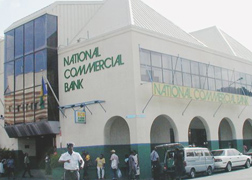
ST. VINCENT: – The Dr Ralph Gonsalves Unity Labour Party (ULP) administration in St Vincent and the Grenadines has privatised the state-owned National Commercial Bank (NCB).
East Caribbean Financial Holding Company Limited (ECFH) of Saint Lucia now owns 51 per cent of the NCB.
ECFH is parent company of the Bank of Saint Lucia Limited.
A joint media release said the government of SVG will retain 49 per cent of the shares, and intends to divest 29 per cent of the shares to the country’s National Insurance Service and citizens of SVG, including bank staff and citizens of the region within the next 12 months.
All formalities of the ECFH acquisition are expected to be finalized by Oct. 31, 2010.
The transaction is subject to regulatory approval of the Eastern Caribbean Central Bank and the release said “this approval is expected to be forthcoming”.
The deal was sealed last week following an invitation by the Gonsalves administration to ECFH to consider acquiring an interest in the NCB. (Go to the homepage to subscribe to I Witness-News)
“In pursuance of the Government of St. Vincent and the Grenadines’ stated policy on the privatization of the Bank; the ECFH Group’s vision of regional expansion and in support of the Eastern Caribbean Central Bank’s (ECCB) efforts at strengthening the banking system through mergers and alliances, ECFH was pleased to accept the invitation,” the release said.
Gonsalves, speaking at a media briefing on Monday, Oct. 4, said the bank will be renamed “Bank of St. Vincent and the Grenadines”.
He said every government since independence in 1979 has considered privatising the NCB, including the New Democratic Party (NDP) administrations of which Leader of the Opposition and NDP President Arnhim Eustace was a member.
“The ULP was awaiting the right moment to divest shares. Four factors make this the right moment: the strengthening of the bank since 2001; the agreement of the Caribbean Development Bank to assist in the process of divestment; the inducing external financial economic environment; and the regional financial institution, the Bank of St. Lucia, which will provide the correct fit at a fair and reasonable price for the majority shareholding, combined with other favourable condition,” Gonsalves said.
“I had to build the bank, I had to reform it. I had to change it and bring it to a stage where I could get a reasonable price; because, all things being equal, companies trade at their book value,” Gonsalves said without disclosing how much ECFH had paid for its 51 per cent share in the NCB.
“… I had to get a good partner, a good fit. Other partners came looking, you know. But like in anything else, when you are desirable, women will know this, a lot of men will come, but you reject several until you find the right one. … Now I am not saying there may not be a better partner, but if you wait too long, you might lose a good partner and then you think you are getting a better one and it [is] worse,” added Gonsalves, who, as prime minister, was the NCB’s principal nominal shareholder.
Election issue
The NCB has become a prominent issue in the campaign for the next general elections, constitutionally due by March next year.
The Caribbean Development Bank (CDB) in July loaned the government EC$100 million “to reduce the outstanding public sector debt” at the NCB, and to “facilitate a restructuring” of the institution even as government explored “other modalities of ownership”.
Eustace has said that Gonsalves did not tell Parliament that the NCB had to be sold before his government could access the loan.
Eustace — an economist and former prime minister and a former minister of finance — has criticised the Gonsalves administration, saying its mismanagement necessitated the sale of the NCB. (Follow I Witness-News on Facebook)
Gonsalves, who is also minister of finance, has defended his administration’s management of the bank, saying that it is stronger now than when his administration came to office in March 2001.
He said last week that in 2001, government equity amounted to just over EC$20 million compared to EC$84 million at the last evaluation.
Also in 2001, the public sector owed the NCB about EC$110 million, or 42 per cent of total deposit.
This year, Gonsalves said, the public sector debt was EC$160 million, or 28 per cent of total deposits.
Eustace, in his Budget Address of 2000, said his NDP government would be “…prepared to divest itself of shares in selected enterprises, starting with its shares in the National Commercial Bank and the St. Vincent Electricity Services”.
Eustace, who was also prime minister at the time, said his administration, would “in the first instance give priority to local investors in a manner that facilitates the widest possible ownership so that the ‘small man’ can purchase shares”.
Eustace, who lost the March 2001 general elections, defended that policy during his weekly appearance on his party’s programme on Nice Radio on Monday, Sept. 4.
“… We said to local investor, not to St. Lucians. In addition we provided incentives to privately owned firms in the country to offer some shares to their employees and the general public. … [T]he objective was to get the widest local ownership as possible,” Eustace said.
“This never contemplated the sale of NCB to [foreigners]. … It contemplated sale to local investors with the widest possible ownership of the bank,” he added.





